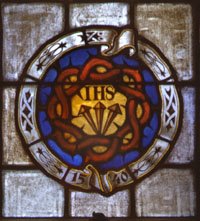John Berchmans and Elizabeth Koczera.
Today is the Memorial of St. John Berchmans, a 17th century Jesuit remembered for his piety and his fidelity to the rules of the Society. Berchmans overcome parental opposition to the enter the Society of Jesus at the age of seventeen and died only five years later as a Jesuit scholastic studying in Rome. Some accounts of Berchmans' life claim that his death was hastened by the extreme effort he put into studying for the De Universa, the comprehensive oral examination that comes at the conclusion of a Jesuit's philosophy studies. John Berchmans may have been a model scholastic in many respects, but I hope my cohorts and I avoid following his example too closely when we're preparing to take the De U.
Today is also my sister's twentieth birthday. In a purely unintentional coincidence, Liz is spending her birthday this year not too far from John Berchmans' Belgian birthplace. I wish her well as she celebrates this happy day in the midst of what sounds like a very enjoyable sojourn in the Low Countries (extensively reported on her blog). I look forward to hearing more of her adventures, and I hope this birthday is one she'll remember fondly for years to come. AMDG.




